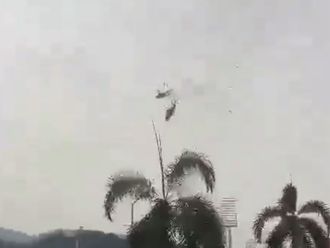Kabul: Gunmen killed 13 passengers travelling on a bus in Afghanistan on Tuesday, underlining the country’s fragile security situation.
The attack in Wardak province, which lies close to Kabul, is the latest to hit civilians in Afghanistan’s still-bloody conflict.
Ataullah Khogyani, the spokesman for the Wardak provincial governor, said a group of gunmen opened fire on a bus around 1:00 am (2030 GMT Monday), killing 13 people including one woman.
The bus was heading for the restive southern city of Kandahar, once a bastion of the Taliban.
The Taliban’s chief spokesman, Zabihullah Mujahid, denied they were behind Tuesday’s attack, though the district where it happened is known to have a stong militant presence.
The Taliban often deny attacks that involve a high civilian death toll.
Mohammad Ali, the deputy governor of neighbouring Ghazni province, confirmed the incident and said the gunmen picked their victims and shot them one by one.
Both officials said the motive for the attack was still under investigation. It was unclear if anyone from the bus escaped the attack.
Last month, masked gunmen abducted 30 Shiites from the Hazara ethnic group from a bus in Zabul province. They have still not been recovered.
Fears of rising sectarian conflict were stoked further when gunmen attacked a Sufi mosque in Kabul earlier this month, killing at least six people.
The Taliban distanced themselves from both incidents, and sectarian violence targeting minority Shiites and Sufis is more common across the border in Pakistan.
But the rare attacks have sent shockwaves through both communities, who see them as chilling reminders of the Taliban’s rule from 1996 to 2001, when minorities were heavily persecuted.
NATO ended its combat operation against the Taliban in December after 13 years of war, leaving Afghan forces to deal with the militants themselves.
A smaller contingent of foreign troops, most of them American, is staying on for training and counter-terror operations.
But there have been fears that without the military muscle of the US-led NATO coalition behind them, Afghan forces could struggle to quell a still-resilient insurgency.
The Pentagon insists Afghan forces are holding their own in the fight, but senior US officers have voiced concern that they are sustaining casualties at an “unsustainable” rate.
The number of civilians killed and wounded in Afghanistan jumped 22 percent in 2014, the United Nations said last month, as NATO troops withdrew from combat.












